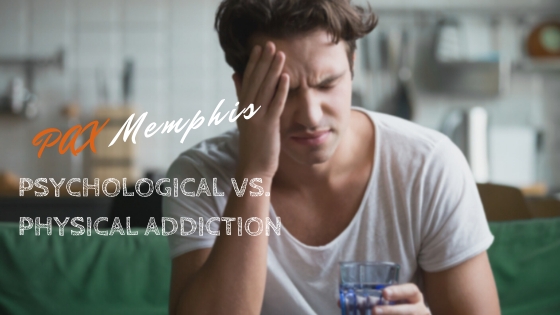Hundreds of people die from the disease of addiction on a daily basis. Due to growing concerns about drug and alcohol addiction in the United States, people are seeking information about the subject more than ever. Friends and families of addicts are tirelessly trying to understand why people abuse substances and how they become addicted. The truth is, there are two aspects of addiction, and sometimes, one can exist without the other. The two main components of addiction are psychological addiction and physical addiction.
When you understand how both of these components operate within the mind and body of an addict, you will better understand what you or your loved one is going through. People often debate whether addiction is a choice or a disease. However, not everyone knows the difference between psychological and physical addictions. In many cases, one leads to another, and they end up occurring simultaneously. As a result, people usually need both medical detox and an addiction treatment program to overcome both aspects of addiction.
Physical Addiction
Physical addiction, or physical dependence, ultimately leads to withdrawal symptoms. In many cases, people desperately seek more drugs or alcohol to avoid the unpleasant symptoms of withdrawal. However, dependence doesn’t develop overnight. Look at heroin, for example. The first time a person does heroin, they won’t experience withdrawal symptoms the next day. If this person continues to use heroin on a daily basis, he or she will develop tolerance and physical addiction. It takes time for dependence to develop, and the longer a substance is abused, the more dependent the body will become, and the worse withdrawal symptoms will be.[1]
When a physical dependence develops, people may feel as though they cannot function normally without the drug. In addition, they will experience a variety of withdrawal symptoms that take a serious toll on the body. Withdrawal symptoms vary depending on which substance is being abused, but all withdrawals are unpleasant. When a person who is physically addicted is suffering withdrawal, he or she may use drugs or alcohol again to stop feeling sick, even if this person has a desire to get sober.
Psychological Addiction
The psychological aspect of addiction is extremely complex. Psychological addiction refers to the strong desire or compulsion to keep drinking or drugging, despite negative consequences or a need to stop. This aspect of addiction sometimes occurs without physical dependency. Sometimes, psychological addiction occurs before physical addiction develops. Other times, people are psychologically addicted to substances that do not cause withdrawal symptoms, like marijuana. This is particularly common with behavioral addictions, such as gambling, sex, or shopping. After all, you don’t have to be physically dependent on something to suffer from addiction.[2]
When people are psychologically addicted to a substance, they have an emotional and mental connection to the substance. For example, a person may feel as though he or she cannot go out in public or cope with emotions without alcohol. Or, a person may be self-medicating an underlying mental health condition or unresolved trauma. Regardless of the situation, these individuals struggle to function normally without drugs or alcohol in their system. In order to keep their emotions and thoughts in check, they rely on a substance.
Psychological addiction involves uncontrollable and difficult cravings to use a substance. People suffering typically spend a lot of time thinking about their substance of choice, using it, and obtaining money to get it. This often leads to anxiety, depression, mood swings, and changes in appetite as well. This aspect of addiction can drive people to do things they would not normally do, such as steal money or lie to their loved ones. Unfortunately, psychological addiction is seemingly torturous. It affects nearly every facet of an addicted person’s life.
Treatment for Physical and Psychological Addiction
Both psychological and physical dependence require professional addiction treatment. Although the two aspects of addictions are separate, the treatment often exists together. If a person is physically addicted to a substance, he or she will experience withdrawals. Consequently, the individual should enter a drug or alcohol detox. Not only are withdrawals uncomfortable, but some of the symptoms and complications may turn fatal. During detox, individuals are monitored around the clock by medical professionals who are ready to intervene in the event of an emergency.
Once the body is cleared of substances, people should attend inpatient treatment to address their psychological addiction. Sometimes, addiction requires dual diagnosis treatment or trauma therapy. These therapies treat the underlying causes of addiction. The purpose is to shed light on the emotional and mental connections to substances – and what drove people to use them in the first place. A person cannot heal from addiction until they treat the emotional and mental facets of it.
Furthermore, addiction treatment programs help individuals prevent relapse and learn healthy coping techniques. These tools allow patients to live healthy, sober lifestyles for years to come. If you or a loved one is suffering from addiction, get help today. Contact our addiction specialists at PAX Memphis today to see how we can help.
References:
Medically Reviewed: September 25, 2019

All of the information on this page has been reviewed and verified by a certified addiction professional.










